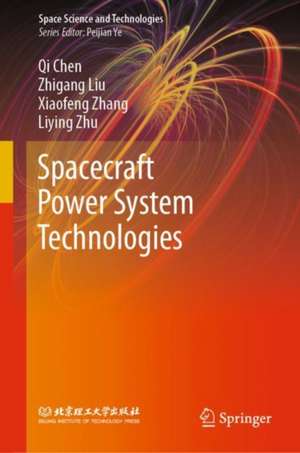Spacecraft Power System Technologies: Space Science and Technologies
Autor Qi Chen, Zhigang Liu, Xiaofeng Zhang, Liying Zhuen Limba Engleză Hardback – 15 aug 2020
| Toate formatele și edițiile | Preț | Express |
|---|---|---|
| Paperback (1) | 1109.29 lei 6-8 săpt. | |
| Springer Nature Singapore – 16 aug 2021 | 1109.29 lei 6-8 săpt. | |
| Hardback (1) | 1115.46 lei 6-8 săpt. | |
| Springer Nature Singapore – 15 aug 2020 | 1115.46 lei 6-8 săpt. |
Preț: 1115.46 lei
Preț vechi: 1360.32 lei
-18% Nou
Puncte Express: 1673
Preț estimativ în valută:
213.44€ • 223.45$ • 176.61£
213.44€ • 223.45$ • 176.61£
Carte tipărită la comandă
Livrare economică 05-19 aprilie
Preluare comenzi: 021 569.72.76
Specificații
ISBN-13: 9789811548383
ISBN-10: 9811548382
Ilustrații: XX, 307 p. 152 illus., 97 illus. in color.
Dimensiuni: 155 x 235 mm
Greutate: 0.64 kg
Ediția:1st ed. 2020
Editura: Springer Nature Singapore
Colecția Springer
Seria Space Science and Technologies
Locul publicării:Singapore, Singapore
ISBN-10: 9811548382
Ilustrații: XX, 307 p. 152 illus., 97 illus. in color.
Dimensiuni: 155 x 235 mm
Greutate: 0.64 kg
Ediția:1st ed. 2020
Editura: Springer Nature Singapore
Colecția Springer
Seria Space Science and Technologies
Locul publicării:Singapore, Singapore
Cuprins
Introduction.- Design of Primary Power Subsystem.- Design of System-circuit Subsystem (SCS).- Design Example of Power System.- Reliability and Safety Design for Power System.- Analysis and Control of Technical Risks in Power System.- Power System Testing and Environment Experiments.- Autonomous Management of Power System.- Space Task Requirements and Power Development Trends.
Notă biografică
Professor Qi Chen is the Vice President of Institute of Spacecraft System Engineering,CAST, and a member of the Space Energy Specialized Committee, China Astronautics Society. Dr. Chen has made significant contributions to multiple successful Chinese flights, such as the HY-2 satellite, and was the project leader on a number of civil space and equipment research projects. He won the China Aerospace Fund Award in 2014, the first prize for defense science and technology progress in 2015, and the first prize in science and technology progress awarded by the China Aerospace Science and Technology Group.
Dr. Zhigang Liu is a Senior Engineer at Institute of Spacecraft System Engineering,CAST. His work mainly focuses on spacecraft power supply and distribution system design, high-power spacecraft energy management, and near-field wireless energy transfer technologies. He has participated in the research and development of the “Chang’E-5” flight tester and the power supply and distribution subsystems for the Mars probe. He has presided over a number of special projects in national defense science and technology innovation zones, equipment prefabrication sharing technology, and special technologies for pre-research projects in the field of aerospace. He has published more than 20 papers in academic journals and holds more than 10 national invention patents and 5 software copyrights.
Xiaofeng Zhang is a Senior Engineer at Institute of Spacecraft System Engineering,CAST. His work mainly focuses on the overall design of spacecraft power systems, space distributed energy control, and the Internet. He has actively participated in the research and development of power supply subsystems such as “BD-2” and “BD-3” space infrastructures, has presided over a key national defense basic scientific research project, and participated in a number of civil aerospace and equipment pre-research projects. He won the second prizefor military science and technology progress in 2013, has published more than 20 papers in academic journals, and holds 5 national invention patents and 3 software copyrights.
Dr. Liying Zhu is currently working at Institute of Spacecraft System Engineering,CAST. Her chief areas of expertise are spacecraft power supply and distribution system design, high-power spacecraft energy management, and near-field wireless energy transfer technologies. She has participated in “ZY3000,” “Beidou-3,” and various R&D projects in the aerospace field. She has published more than 30 papers in academic journals and holds 5 national patents.
Textul de pe ultima copertă
This book provides an introduction to the main design principles, methods, procedures, and development trends in spacecraft power systems. It is divided into nine chapters, the first of which covers the classification and main components of primary power system design and power distribution system design. In turn, Chapters 2 to 4 focus on the spacecraft power system design experience and review the latest typical design cases concerning spacecraft power systems in China. More specifically, these chapters also introduce readers to the topological structure and key technologies used in spacecraft power systems. Chapters 5 to 7 address power system reliability and safety design, risk analysis and control, and in-orbit management in China’s spacecraft engineering projects. The book’s closing chapters provide essential information on new power systems and technologies, such as space nuclear power, micro- and nano-satellite power systems, and space energy interconnection systems. An outlook on future development trends rounds out the coverage.
Caracteristici
Provides readers with detailed concepts and design theories for space power systems Presents the procedures and design methods for power system reliability and security, risk analysis and control, testing, and in-orbit management in China’s spacecraft engineering projects Discusses the typical designs of spacecraft power systems in the fields of communication, navigation, remote sensing, manned spacecraft, and deep space exploration











